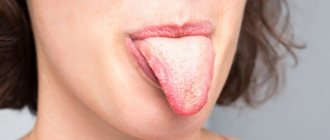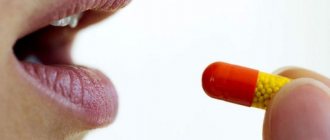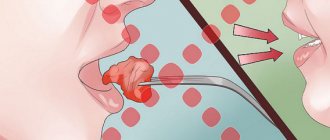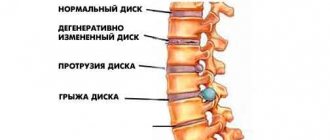The main reason why there is a sour taste in the mouth is diseases of the digestive system, in most cases, the stomach. This is not always gastritis: a peptic ulcer, a diaphragmatic hernia, or a weak muscle between the stomach and esophagus can cause the problem. A sour taste can also occur due to other diseases and conditions, for example, pathologies of the gallbladder, pancreas, or dental problems.
Next, we will look at what could be the cause of a sour taste in the mouth - based on the shades of this very sour taste. But we warn you: only a doctor can make an accurate diagnosis. And it’s still worth going to see him. Do you know why? Because inflammation that exists for a long time in any organ greatly increases the likelihood of cancer developing in it. After all, cells change during inflammation, and who knows when the immune system will stop noticing them?
Causes of sour taste in mouth after eating
In some cases, it happens that you live calmly and consider yourself healthy, but then a problem arises: after eating food with some taste characteristics, a sour taste appears.
Taste after sour food
If a sour taste in the mouth appears after sour food, and it lasts no more than 20 minutes, and then goes away - everything is fine, that’s how it should be.
It’s worse if you ate sour food more than half an hour ago, but even after drinking water or eating something non-sour, you feel this taste. Then look for the reason using the following algorithm:
- Have you put any crowns or dentures on your teeth? Have you had implants installed? They, having entered into a chemical interaction with sour food, can cause such an aftertaste. It is usually not pure sour, but has a certain metallic tint.
- Think about it: did you bend over after eating? Didn't go to bed - on your stomach, back or side? If yes, then this indicates that you have gastroesophageal reflux disease - a condition when the muscle between the esophagus and the stomach does not work well, and the contents of the stomach (if there is a lot of it, or certain conditions are created) are thrown into the esophagus.
- If you did not go to bed after eating acidic food, then most likely you have chronic gastritis with high acidity. With your food, you forced the stomach to work in an enhanced mode - dumping acid not only into the duodenum, but also throwing part of it into the esophagus. In this case, during the day you can expect pain (of varying intensity) in the pit of the stomach and increased gas formation. If there is a lot of acidic food, gastritis can worsen. Then pain, nausea, heartburn, and belching will occur for several days. The stool may become softer or even loose, but not frequent. There is a white coating on the tongue.
- Frequent loose stools combined with intense abdominal pain, nausea, and flatulence will most likely be caused by pancreatitis. This condition requires urgent medical examination. Since if pancreatitis is acute, then the enzymes secreted by the inflamed pancreas can “corrode” both the gland itself and the organs that are close to it. And this is life-threatening. In fact, pancreatitis is rarely caused by acidic foods. More often it is provoked by spicy foods, smoked foods and alcohol. Maybe you combined their intake, and now you’re “sinning” with a piece of lemon?
Sour taste after sweet food
It is quite unusual when, after eating something sweet, a sour taste suddenly appears. But this is hardly a sign of diabetes. Such a symptom most likely indicates inflammation that exists in the oral cavity, and which “manifested” against the background of how well you “fed” the microbes with sweets. The source of inflammation can be:
- gum;
- nasopharynx (chronic rhinitis, pharyngitis);
- periodontium is the tissue around the tooth.
First, go to an ENT doctor: he will examine your nasal and oral cavity and see the decayed teeth. And if the otolaryngologist did not notice anything, and you yourself do not notice loose or diseased teeth, and your gums do not bleed when brushing your teeth, donate blood for sugar - only on an empty stomach. And stop overindulging in sweets!
Feeling sour after any meal
Whatever you eat, if you feel a sour taste after eating, this indicates conditions, three of which are discussed above. This:
- gastroesophageal reflux disease;
- chronic gastritis;
- metal implants/prostheses/braces/crowns;
- peptic ulcer, most likely of the duodenum.
The most common cause would be gastritis.
Classification of the condition according to its manifestations
In medicine, it is customary to distinguish 4 types of sour taste:
- sweet and sour;
- sour-bitter;
- sour and salty;
- sour with metallic.
A sweet and sour taste indicates the presence of problems in the functioning of the nervous system, which manifests itself especially clearly after experiencing stress. It also appears against the background of an increased concentration of sugar in the blood after eating sweets, as well as due to some pathologies of the digestive process, or a sharp cessation of smoking by a heavy smoker.
If a person develops periodontal disease, caries or gingivitis, the presence of a sweet and sour taste in the oral cavity can determine their onset. The appearance of an unpleasant taste along with nausea and odor indicates possible intoxication of the body, including intoxication with medications, chemicals such as pesticides, and carbonic acid dichloride.
Why is a person bothered by a bitter and sour taste? Often this phenomenon is observed in the morning after sleep, it can be present constantly, that is, all day, or temporarily.
Among the main reasons for the appearance:
- eating unhealthy food the night before, and the subsequent functional load on the liver and intestines during the night;
- drinking significant amounts of alcohol;
- allergic reactions;
- antibiotic treatment;
- pill abuse;
- cholecystitis;
- stomach or intestinal ulcer.
The sensation is also present with gastritis and pancreatitis.
If a person suffers from nicotine addiction and smokes a lot of cigarettes before bed, at night he will experience a bitter and sour taste.
An acidic, metallic aftertaste is primarily due to the presence of metal crowns on the teeth, piercings, or metal dentures in the mouth. In addition, a metallic and sour taste appears as a symptom of gingivitis, stomatitis, periodontal disease, diabetes, anemia, and bleeding ulcers. After a tooth is removed, a metallic taste indicates that the resulting wound is bleeding. In pregnant women, it is observed against the background of hormonal changes associated with their position. It can appear in adolescents during puberty, or in women during menopause.
Characteristic of prolonged or acute poisoning with compounds of heavy metals - mercury, lead, copper, arsenic, zinc.
Acid with a salty taste is a sure sign of an inflammatory process of the salivary glands (siloadenitis), which manifests itself in the presence of pathologies of the ENT organs, mumps, Sjogren's disease, and is sometimes felt after prolonged crying or during a runny nose. People with an unbalanced diet complain of a similar feeling. The feeling is especially aggravated after drinking coffee, strong tea, energy drinks, sweet soda, or may accompany a state of dehydration.
Causes of sour taste outside of food
When the taste appears after eating, it seems clear: the food is to blame. But if a symptom occurs outside of eating, what does this mean? To highlight the possible reasons, we will analyze them by shades of sour. After all, the treatment will be based on the reasons.
Just a sour taste
You do not associate the appearance of the taste with food, then it could be:
- Chronic gastroduodenitis, when inflammation is localized at the junction of the stomach and duodenum. It manifests itself as pain in the pit of the stomach, heartburn, attacks of nausea and (sometimes) vomiting.
- Peptic ulcer of the stomach or duodenum. In terms of symptoms, it is not very different from gastritis or duodenitis and does not differ for everyone. In both cases there will be a white tongue and a sour taste. Therefore, an accurate diagnosis can only be made based on the results of a FEGDS study - examination of the esophagus and stomach using a special “probe”.
- Taking medications that increase acidity. These are glucocorticoid hormones, painkillers and some other medications.
- Kidney disease, which causes electrolyte balance to be disrupted. Not all of them are manifested by some kind of pain or change in the smell of urine. Many kidney disorders are asymptomatic. They can be suspected by the appearance of edema and increased blood pressure (which is detected “accidentally”, for example, when measuring pressure during a headache or “floaters” before the eyes). Unfortunately, edema does not cause enough concern in people. And people who get up in the morning with a little “swollen” face say: “I drank some fluids at night.” But if the kidneys worked normally, there would be no such “swelling”, no matter how much you drink!
- Sialadenitis. This is the name for inflammation of the salivary glands. If it is acute, then in addition to a taste in the mouth, the temperature will rise, it will become difficult to open the mouth, redness and swelling will appear in the jaw and neck area. If you had just such an attack, after which all the symptoms went away, but you feel dryness and a sour taste in your mouth, this is chronic sialadenitis.
Sour-bitter taste
Bitterness in the mouth indicates that the bile ducts are involved. In combination with acid, this means that bile released in a large volume (or under increased pressure) entered the duodenum and caused its increased motility. And the intestine throws part of the bile into the stomach (which reacts with acid), and sends part through the small intestine.
The stomach does not like the alkaline content that has entered it, and it tries to dilute it with acid. As a result, there is so much of the latter that it does not have time to descend into the duodenum, and is thrown into the stomach, and from it up the esophagus. This is how a sour, bitter taste appears in the mouth.
What can cause such a reaction from bile? Several situations:
- eating large amounts of fatty foods, especially in combination with alcohol;
- taking drugs that pass through the liver: Metronidazole, Flutamide and others;
- smoking, especially at night;
- bile duct dyskinesia;
- cholecystitis (inflammation of the gallbladder);
- peptic ulcer;
- gastritis.
Why there is a feeling of acid in the mouth in men and women: the main reasons
There are many reasons for the feeling of sourness in the mouth. Therefore, you need to figure out what exactly this symptom is associated with.
What can a sour taste mean with heartburn, dry mouth, belching and other signs?
If the feeling of acidity is combined with the following symptoms:
- Dry mouth. Then we can assume that the body suffers from an imbalance of electrolytes. To avoid this you need to drink more fluid.
- Heartburn. May be a symptom of reflux esophagitis. With this disease, the sphincter, which is supposed to hold the contents of the stomach, relaxes and gastric juice enters the esophagus.
- Sour-salty taste and increased salivation. May occur after abuse of alcohol, energy drinks, or strong coffee. It may also indicate inflammation of the salivary glands.
- Nausea. May be a symptom of gastritis or stomach ulcers.
- Belching. Talks about diseases of the gastrointestinal tract.
- Pain in the right side. May occur after overeating and indicate problems with the gallbladder. In this case, after eating, a sour-bitter taste appears in the mouth.
- Sour-metallic taste. It happens with diabetes, hormonal imbalance, bleeding ulcers, anemia.
- An unpleasant odor is a sign of dysbacteriosis.
- The taste of sour milk is a symptom of worm infection.
Unpleasant sensations after sweets, medications, poisoning
A sour taste sometimes occurs:
Feeling sour in the morning after sleep, at night
If a feeling of acidity occurs after sleep, gastroesophageal reflux may be suspected. As a result of this disease, stomach acid enters the esophagus, causing heartburn, belching and nausea. When a person is in a horizontal position, it is easier for the contents of the stomach to enter the esophagus, so unpleasant symptoms often appear after sleep.
An acidic taste that occurs at night and is accompanied by shortness of breath and hiccups may be a symptom of a diaphragmatic hernia. This occurs when part of the stomach protrudes through the diaphragmatic opening. As a result of this pathology, gastric juice moves upward; small particles of food can even clog the airways.
A sour taste in the mouth is more common in women than in men. This symptom can occur during heavy periods, with hormonal imbalances during menopause and pregnancy.
If the sour taste is felt only in the morning
When a sour taste is felt in your mouth only in the morning, then you need to think about it. If you overeat at night, then this is the reason. But if you don’t eat much, but go to bed 30-60 minutes after you eat or drink, and the next morning you encounter such a “surprise,” you most likely have gastroesophageal reflux.
If you do not recognize either one or the other, then you probably have gastritis or gastroduodenitis. In these cases, nausea and slight bloating are usually noted. After going to the toilet, in which there is more than usual stool, it becomes easier.
Sour taste during pregnancy: normal or pathological?
During pregnancy, this symptom is normal - caused by the reflux of hydrochloric acid from the stomach into the esophagus and above:
- in the early stages it is caused by relaxation of the muscle between the esophagus and stomach;
- in the later stages - an increase in intra-abdominal pressure due to the increased volume of the uterus.
Of course, any of the above diseases can develop during this period. But in all these cases, other symptoms will be noted: pain, bloating, diarrhea, flatulence.
What to do if you have a sour taste in your mouth
Treatment for sour taste in the mouth is carried out after the cause of this condition is determined. To do this you must be examined:
Most likely, you will have to undergo tests such as a smear from the nasopharynx and, possibly, from the back wall of the pharynx, as well as FEGDS. Only then will doctors be able to make a diagnosis and prescribe the correct treatment.
While you have not yet reached the doctor, take the following measures:
- do not take a horizontal position (do not lie down) for 1.5-2 hours after eating;
- the menu should not contain spicy, fried or smoked food;
- don't overeat;
- do not overuse black tea and coffee;
- maintain adequate oral hygiene;
- exclude from your diet those foods that can cause gas formation: sweets, legumes, cabbage, carbonated drinks - alcoholic and non-alcoholic.
Thus, a sour taste in the mouth is rarely a sign of fatal diseases. But the reason that caused it must be discovered and eliminated - before it causes complications. In the meantime, while the examination is underway, follow a diet, practice oral hygiene and do not lie down after eating.
Very often a sour taste appears in the mouth. As a rule, this condition occurs after eating certain foods. However, it also happens that the taste in the mouth torments for no apparent reason and is accompanied by other symptoms.
Why does this happen? Most likely, we are talking about diseases of the internal organs. However, only a specialist can more accurately determine the diagnosis and prescribe treatment after a detailed examination. It is worth noting that when diagnosing, the characteristics of taste are important; it can be sweet and sour, salty and sour, bitter and sour.
Symptoms
The causes and treatment of the disease are completely dependent on each other, but to determine the exact pathology, the doctor needs to know the clinical picture. An unpleasant taste develops in the body due to various etiological factors, and therefore manifests itself in many symptoms. A sour taste may be accompanied by the following indicators:
- pain in the abdomen;
- nausea;
- belching;
- heartburn;
- vomiting reflex;
- strong secretion of saliva;
- broken stool.
Symptoms accompanying a sour taste in the mouth
Causes of sour taste in the mouth
The most common reasons:
- Increased acidity of gastric juice;
- Intestinal or stomach upset;
- Problems with the functionality of the digestive tract;
- Diseases affecting the oral cavity (periodontal disease, gum disease, caries);
- Long-term treatment with medications.
If you experience a sour taste in your mouth, pay attention to other symptoms. For example, if you additionally feel heartburn, this may indicate reflux esophagitis; if you have dry mouth, you may think about a violation of the water-salt balance caused by a lack of fluid in the body.
Acid and bitter taste in the mouth can be a consequence of excessive consumption of smoked or fatty foods.
Pregnant women often suffer from this symptom. This is due to increased pressure in the abdominal cavity, which causes acid to be released from the stomach into the oral cavity.
You shouldn’t guess on your own why there is a sour taste in your mouth. Contact a gastroenterologist for an examination. Only a specialist can adequately diagnose and prescribe the correct treatment. As a rule, therapy consists of following a certain diet and taking medications.
Causes of sweet and sour taste in the mouth
The following reasons are identified:
- Consequences of stress and conflict situations in which blood sugar levels change;
- Excessive consumption of sweets;
- Disease of internal organs in the digestive tract;
- Abrupt cessation of smoking;
- Diseases affecting the oral cavity, in which bacterial microflora multiplies (gingivitis, periodontitis, caries);
- Intoxication with chemicals (pesticides, carbonic acid chloride);
- Side effect from medications.
Sometimes a sweet and sour taste in the mouth can occur with diabetes.
Causes of bitter-sour taste in the mouth
This symptom can be constant or intermittent. At the same time, an unpleasant taste does not always indicate diseases of the internal organs; sometimes it can be a consequence of bad habits.
The most common reasons:
- Eating excessive amounts of fatty and fried foods;
- Taking alcoholic beverages, which increases the load on the gallbladder, stomach and liver;
- Long-term treatment with antibiotics or antiallergic drugs;
- Smoking at night.
Possible diseases that may be accompanied by this symptom: cholecystopancreatitis, gastritis, stomach ulcers and cholecystitis.
How to get rid of acid in the mouth using traditional methods
Unpleasant sensations in the mouth, not associated with pathologies of the gastrointestinal tract and other internal organs, go away if you brush your teeth and rinse with chamomile or mint infusion.
An effective folk remedy for sour taste in the mouth due to gastrointestinal diseases:
- Oregano, St. John's wort and chamomile are taken in equal quantities and mixed.
- Herbal collection will need to take 2 tbsp. l.
- The mixture is poured into a thermos with two glasses of boiling water and left for half an hour.
- The solution is filtered and taken 150 ml in the morning and evening 15 minutes before meals.
- The course of treatment is 10–12 days.
Many people know how to get rid of heartburn and sour belching with baking soda. However, not many people know that scientific medicine classifies bicarbonate as an absorbable antacid. The reaction products of soda and hydrochloric acid penetrate the intestinal walls, then into the blood. These are harmless substances: carbon dioxide and water. There is also a downside to a simple home remedy for heartburn. The released carbon dioxide increases the pressure in the abdominal cavity, thereby indirectly promoting reflux.
You can get rid of sour taste and bitterness in the mouth, heartburn, and belching only with an integrated approach to solving problems. Some symptoms disappear quickly thanks to timely and correct treatment of the underlying disease. Relapses occur due to non-compliance with the diet or incorrectly selected therapy. For complete remission - the disappearance of signs of the disease - a positive psychological attitude and the absence of stress are very important.
Work experience more than 7 years.
Professional skills: diagnosis and treatment of diseases of the gastrointestinal tract and biliary system.
An increase in the feeling of acidity in the oral cavity periodically occurs in most inhabitants of the globe. In most cases, this is possible after eating certain types of food that initially contain excess levels of organic acids. These can be tomatoes, grapes, cherries, cherry plums, and various kinds of berries. If such a sensation in the mouth arose once and went away as suddenly as it appeared without the use of special medications to eliminate it, then in this case there is no particular cause for concern. A serious problem is a condition when a person systematically suffers from a sour taste in the mouth after eating or on an empty stomach. Such a reaction of the body may indicate gastrointestinal diseases.
Features of taste buds
It is worth noting! We have many taste buds in our mouths, thanks to which we have the opportunity to experience the whole variety of tastes that nature pampers us with.
The pleasantness of the aftertaste mainly depends on the quantity and quality of the food we eat, however, this does not always happen .
Let's remember that the oral cavity is the entrance gate to our body, and often an incomprehensible taste is a consequence of improper functioning of the gastrointestinal tract .
And this is not the only reason.
In any case, this condition requires clarification of the causes and timely action.
Any taste other than a neutral one indicates that the body is not functioning properly, but today we will look at the salty taste.
How to treat diseases that cause an acidic feeling in the mouth
As soon as a symptom of acid in the mouth occurs, you need to:
- Give up bad habits: alcohol, smoking. Reduce the amount of coffee and strong tea you drink per day.
- Review your diet, adjust your diet.
- Drink more fluids per day.
- Carefully monitor your oral cavity.
- If possible, stop taking medications or talk to your doctor about replacing them.
Drug therapy
Depending on what disease caused this symptom, the following medications may be prescribed:
- Antacids. Used to neutralize gastric juice, eliminate heartburn and sour belching, help with flatulence and colic. Prescribed for gastritis, peptic ulcers, increased acidity of gastric juice. These include: Phosphalugel, Almagel, Gaviscon, Rennie.
- Antiulcer drugs. Prescribed for stomach and intestinal ulcers, gastritis, gastroesophageal reflux. These drugs help with pain and inflammation: Ranitidine, Roxatidine, Gastrozol, Sanpraz.
- Drugs to enhance motor skills: Metoclopramide, Domperidone. Prescribed for vomiting, nausea, hiccups, and dietary errors. These remedies are used to treat peptic ulcers of the stomach and intestines, gastroesophageal reflux, and problems with the gallbladder.
- Drugs with gastroprotective effects: Vis-Nol, De-nol. They protect the gastric mucosa, heal ulcers, and have a detrimental effect on pathogenic microorganisms. Prescribed to combat the bacterium Helicobacter pylori, which causes ulcers and gastritis of the stomach.
- Prokinetics are drugs that stimulate gastrointestinal motility. These include: Motilium, Motilak. Prescribed for belching, heartburn, nausea.
- Drugs that have an antispasmodic effect: Papaverine, Platiphylline, No-shpa, Atropine. Prescribed for spastic pain, gastritis, stomach ulcers, gastroesophageal reflux, problems in the biliary tract.
- Enzymes: Festal, Mezim, Pakcreatin. For overeating, chronic pancreatitis, heaviness in the stomach and belching.
- Prebiotics and probiotics are drugs that restore intestinal microflora. Bifidumbacterin, Hilak-Forte, Linex. Prescribed for dysbacteriosis.
- Sorbents are drugs that are prescribed to cleanse the body of poisons and toxins: Polyphepan, Polysorb, Enterosgel. Prescribed for poisoning with poisons and salts of heavy metals, toxins, and alcohol.
Causes of salty taste caused by diseases
There are quite a few possible reasons for the prolonged manifestation of salty taste..
Keep in mind! Most of them indicate certain diseases or health problems:
- The most important reason and most common is a lack of water in the body. This happens as a consequence of a small amount of fluid consumed due to an incorrect diet, more often in women, or heavy consumption of fatty or spicy foods. With minimal water consumption (normally one and a half to two liters, not counting tea, milk, juices or first courses), the composition of saliva changes. This leads to a change in taste, and there is also a release of fluid from the body’s cells. At the same time, the blood thickens and in the mouth, along with the salty taste, a taste of iron may appear. The situation is aggravated by the use of diuretics.
- The next, no less common reason is insufficient attention to caring for the oral cavity and, consequently, the condition of the teeth. Nowadays, on the shelves of stores and pharmacies there is a huge selection of all kinds of toothpastes, toothbrushes, cleaning products and rinses for teeth. But sometimes people think that chewing gum or simply rinsing their mouth is enough. In this condition, harmful microorganisms accumulate in the mouth, which, when decomposed, form a film on the teeth. This gives the corresponding taste, and often an unpleasant odor. The consequence of poor oral hygiene can be dental disease, followed by inflammation of the gums, bleeding and inflammation of the salivary glands.
- The presence of infectious diseases in the nasopharynx can also become an indirect cause of a salty taste. Salty mucus coats the walls of the larynx and, when coughing or coughing, spreads this unpleasant taste. This problem cannot be solved without an ENT doctor.
- The same symptoms appear with a runny nose, which appears as a result of a cold or allergies. In this case, regular runny nose remedies will help clear the nasal passages.
- Oncological diseases in themselves do not provide taste sensations. But the consequences of treatment with drugs and radiation therapy lead to the failure of many body functions and, accordingly, to a change in taste perception.
- Another good reason for the appearance of a salty taste in the mouth is a disorder of the nervous system. All the feelings we experience are controlled by the brain, and any disruption of this connection leads to a change in taste. The cause may be stress or nervous tension. Even the very fact of the appearance of a taste brings a feeling of discomfort, in which irritation increases. The person sleeps poorly and as a result becomes aggressive. It turns out to be a vicious circle.
Causes not related to diseases
- Tears . In overly emotional people, tear fluid is secreted in large quantities through the nasal passages and, accordingly, enters the throat. And yet, one should not exclude infections and allergic reactions, which cause irritation of the mucous membranes and the release of tear fluid.
- Alcohol and smoking. Addiction to such bad habits leads to an imbalance in the salt balance in the body and also provokes a feeling of salty taste. Alcohol destroys the liver and the result of its destruction is a bitter and salty taste.
- Medications. Sometimes painkillers and antiseptics, for example, when visiting the dentist, can also affect the composition of saliva. Stopping the use of these medications will normalize the general condition.
- Salt. Eating large quantities of salty, especially dry food in the form of crackers, chips or salted nuts causes a persistent taste of salt in the mouth. You can get rid of it simply by rinsing your mouth well or brushing your teeth.
- Pregnancy. Temporary restructuring of the body during pregnancy and subsequent lactation is another natural process in which taste buds change and a salty taste appears in the mouth.
Once again about how to avoid bitterness in the mouth
From all of the above we can draw clear conclusions:
- Most often, in order to get rid of the risk of bitterness in the mouth during antibiotic treatment, it is enough to strictly adhere to the doctor’s prescriptions and recommendations and follow a special diet.
- And if bitterness and other side effects still begin to bother you, then the doctor in such cases reconsiders the prescription, refusing the drugs that cause the said reaction, or replacing them with suitable analogues.
- Those who have felt the negative effects of the drug can come to the aid of taking hepatoprotectors that support liver function and probiotics that restore microflora.
If you have a bitter taste in your mouth after taking antibiotics, then you should think about continuing antibiotic therapy. The appearance of unpleasant symptoms may signal an exacerbation or development of diseases of the liver, intestines or gall bladder. But do not panic, bitterness can act as a side effect, which quite often occurs during antibacterial therapy.
Associated symptoms
Stay up to date! Such an unpleasant sensation as a salty taste is always accompanied by unpleasant, discomforting symptoms:
- When taking medications, lips become dry and discomfort occurs on the tongue ;
- Increased secretion of saliva, pain in the jaw area , pain due to enlarged lymph nodes due to inflammation of the salivary glands;
- Bleeding gums, toothache, suppuration of gums due to dental diseases;
- Plaque on the tongue due to inflammation of the oral cavity, nasopharynx and bronchi;
- Irritation of the mucous membranes and the appearance of blood streaks in the sputum occurs when coughing or expectoration;
- Sore throat when coughing;
- Severe poisoning and diarrhea lead to large loss of fluid in the body, vomiting and dizziness;
- With severe dehydration , osteochondrosis develops and the skin dries out ;
- During pregnancy - changes in smells and an unbearable desire to try unusual foods, toxicosis.
Methods of treatment and prevention
There is a set of effective measures that do not require treatment or additional medications:
- You need to get into the habit of rinsing your mouth after eating with infusions and decoctions of various aseptic herbs, such as sage, chamomile or oak bark.
- Healthy lifestyle It is advisable to eat food that is considered healthy. One that is truly beneficial and contains fiber, vitamins, minerals and other beneficial microelements.
- It is imperative to maintain oral hygiene, clean your teeth efficiently and thoroughly with a brush and toothpaste, use floss and mouthwash - this will avoid the appearance of acid and bitterness in the mouth with a coating on the tongue of different shades (yellow, mustard, greenish).
- Consult a dentist and a doctor who specializes in digestive problems.
Acid in the mouth is not very pleasant, so it is necessary to take into account the signals that the body gives us; behind them there may be serious reasons that require prompt treatment.
Diagnostics
If the salty taste has become persistent, you should contact your doctor to find out the reasons.
During the initial examination, the doctor must familiarize himself with the patient’s medical history, take into account all complaints and note symptoms , and, if necessary, examine visually and by palpation (if the lymph nodes are enlarged).
Note! Then a set of necessary tests is prescribed to accurately determine the possible disease:
- A detailed blood test to check for infection;
- Biochemistry blood test to determine the amount of enzymes produced by the kidneys;
- A general urine test will show the degree of dehydration;
- Sanitation of the oral cavity (examination of mucous secretions will help determine what led to the inflammatory process - an allergy or an infection);
- Ultrasound of the maxillary and nasal sinuses will give a clear picture of the structure of the soft tissues and the presence of pus;
- An x-ray of the nasal septum will show the presence of a cartilaginous septum or its curvature;
- MRI and CT will give a complete overview of any tissue in every detail using micro-section images.
Important! After the examination results are obtained, the patient is referred to a specialist for further treatment.
Eliminating symptoms
If the reason is dehydration , then the doctor will recommend balancing your diet, eliminating dry, smoked, canned foods and drinking more water .
You should also reduce the consumption of coffee and alcohol, as they provoke the removal of fluid from the body.
If the cause is developing infections , then specialized doctors prescribe drug treatment.
For infectious inflammation of the oral cavity, such as stomatitis, treatment will be carried out depending on the type of inflammation.
If this is a viral disease, then the following are prescribed :
- Antiviral drugs (Arbidol, Zovirax or Acyclovir);
- Preparations for tissue regeneration (Solcoseryl, Carotolin or vitamin A);
- Antiallergic (Suprastin or Larotodin);
- Immunostimulating agents (Immunal or Imudon).
Know! In case of bacterial damage to the mucous membrane and tissues of the oral cavity, which usually occurs after influenza or sore throat, treatment is carried out with other drugs:
- Antiseptic drugs (Furacilin, Trichopolum and Metrogyl);
- Antibiotics (Ampiox, Lincomycin or Gentamicin);
- Anti-inflammatory drugs (Solcoseryl).
For candidiasis of the oral mucosa it is used:
- Antifungal antibiotics (Clotrimazole, Nystatin, Nizoral, Flucanozole);
- General strengthening drugs (vitamins B, C, PP);
- Preparations containing iodine and topical ointments (Nystatin and Levorin).
- Iron-containing preparations;
- Antiallergic (Diphenhydramine, Suprastin).
Stay up to date! Diseases of teeth and gums are treated on an outpatient basis, as well as with the use of antibiotics and anti-inflammatory and disinfectant drugs.
Additionally, rinsing with decoctions of oak bark, chamomile and sage is prescribed.
For inflammation of the salivary glands (Sialoadenitis), the following drugs are prescribed:
- Anti-inflammatory (Nimesil, Ibuprofen, Ketanov);
- Analgesics (Amidopyrine, Analgin);
- Drugs to relieve spasms (Spazmalgon, No-shpa);
- Rinses (Furacillin, Chlorophyllipt).
A disease such as sinusitis is classified as infectious, and the following medications are prescribed
- Nasal sprays or drops to ease breathing and relieve swelling (Sanorin, Tizin, Flixonase, Nasonex);
- Antiallergic (Erius, Citrine, Claritin);
- Anti-inflammatory drugs (Aspirin, Ibuprofen, Acetomenophen);
- Antibiotics (Levofloxacin, Amoxicillin).
- Airway stimulants (Guaifenesin).
Reference! Inflammation and blockage of the tear ducts are also treated with the prescription of antibiotics, hormonal and anti-inflammatory drugs:
- Eye drops (Tsipromed, Levomiticin, Hydrocortisone, Dexamethasone, Betamethasone);
- Ointments (Tetracycline, Erythromycin, Levomekol);
- Penicillin preparations, Ketorol and Ketanov.
Diseases of the upper respiratory tract are treated with expectorants (Ambroxol, Berotek), antibiotics when indicated.
Antihistamines are prescribed . Massage, warming and drinking plenty of fluids are recommended.
In case of cancer, medications to alleviate the condition are prescribed by the doctor depending on the medications taken.
Remember! For symptoms of nervous system disease, vitamin B preparations, vasodilators and medications that improve blood circulation are prescribed.
Prevention
When the first signs of taste appear, it is advisable to start eating more fruits and vegetables, add cereals, chicken, fish, and nuts.
Reduce the consumption of salty foods, alcohol and drinks containing caffeine, as well as limit pickles, fried and smoked foods .
As practice shows, including decoctions of bitter herbs in the diet prevents the proliferation of pathogenic bacteria, improves overall well-being and strengthens the immune system.
To prevent a salty taste in your mouth, you should first adhere to basic oral hygiene rules.
You also need to visit the dentist once every six months , do not limit yourself in drinking and eat right.
Keep in mind! The most important thing is to eliminate, if possible, provoking factors that affect the emotional state.











